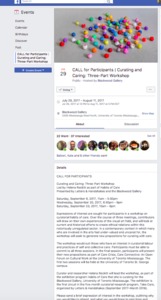Curating and Caring: Three-Part Workshop
Reckitt, Helena. 2017. 'Curating and Caring: Three-Part Workshop'. In: Habits of Care. University of Toronto, Canada 9-23 September 2017. [Conference or Workshop Item]
![[img]](https://research.gold.ac.uk/22706/1.hassmallThumbnailVersion/Curating%20%26%20Caring_Workshop_Facebook%20Screen%20Shot.png)
|
Image
Curating & Caring_Workshop_Facebook Screen Shot.png Download (185kB) | Preview |
Abstract or Description
Over the course of three meetings, workshop contributors drew on their experiences of working and participating in the visual art field to explore engrained curatorial habits of care, and the value systems that they reflect, as well as sharing their ideas for how these practices of care could be rethought and restructured. Discussing current and historical efforts to create ethical relations within the notoriously unregulated contemporary art sector, the workshop sought to generate new propositions for curating with care in a contemporary context in which many who are involved in the arts feel under-valued and uncared for.
Discussions were informed by readings from authors including Sara Ahmed, Binna Choi, Johanna Hedva, Marta Malo de Molina, Park McArthur, and a text by Victoria Horne, Kirsten Lloyd, Jenny Richards, and Catherine Spencer. Curatorial case studies discussed included Eastside Projects, Policy Show and CASCO, The Grand Domestic Revolution. The work of artists Alex Martinis Roe concerning the construction of feminist genealogies and generations, and Mierle Laderman Ukeles on maintenance, care and reproductive labour also provided key touchstones.
Devised and led by Helena Reckitt, the Workshop was realised with the administrative and facilitation assistance of Blackwood Gallery staff members Christine Shaw, Director/Curator; Jayne Wilkinson, Assistant Curator; and Joy Xiang, Curatorial Research Assistant.
The workshop was part of the programme for the exhibition ‘Habits of Care,’ curated by Helena Reckitt for the Blackwood Gallery, University of Toronto Mississauga, which formed part of the first circuit in the five-month curatorial research program, Take Care, organised by Letters & Handshakes (September 2017–March 2018).
Workshop participants presented their collectively-generated Propositions for Curatorial Care at the third meeting as part of 'Care Crisis, Care Connective: An Open Forum on Cultural Work,' at the University of Toronto Mississauga.
|
Item Type: |
Conference or Workshop Item (Other) |
||||||
| Additional Information: |
Workshop participants presented their collectively-generated Propositions for Curatorial Care at the public forum 'Care Crisis, Care Connective: An Open Forum on Cultural Work,' at the University of Toronto Mississauga. Their propositions developed from a series of starting points: Our proposition is that there are no authorities. Questions / Things to keep in mind for discussion, included: |
||||||
| Keywords: |
Curating and Caring Socially reproductive Labour Cultural Labour Self Care and Collective Care Institutional Analysis |
||||||
| Related URLs: |
|
||||||
| Departments, Centres and Research Units: |
|||||||
| Dates: |
|
||||||
| Event Location: |
University of Toronto, Canada |
||||||
| Date range: |
9-23 September 2017 |
||||||
| Item ID: |
22706 |
||||||
| Date Deposited: |
09 Jan 2018 12:35 |
||||||
| Last Modified: |
29 Apr 2020 16:43 |
||||||
|
URI: |
View statistics for this item...
 |
Edit Record (login required) |

 Tools
Tools Tools
Tools
